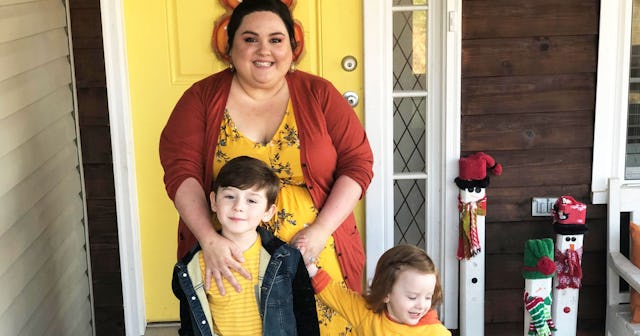Polycystic Ovarian Syndrome Is More Common Than You Might Think

If you have ovaries, you have about a 1 in 10 chance of having PCOS.
PCOS stands for polycystic ovarian syndrome which, according to the PCOS Awareness Association, is “a variable disorder that is marked especially by amenorrhea, hirsutism, obesity, infertility, and ovarian enlargement and is usually initiated by an elevated level of luteinizing hormone, androgen, or estrogen which results in an abnormal cycle of gonadotropin release by the pituitary gland.”
That’s a long, medical explanation, but it comes down to this: All the hormones involved in reproduction just kind of do their own thing in a body with PCOS without following the normal pattern. As a result, people with PCOS experience irregular periods, excess body hair, trouble getting and staying pregnant, and for many of us, weight gain.
For some people, PCOS shows up later in life, but I was diagnosed shortly after puberty. Pretty much as soon as I started having periods, I started having problems.
Ask me how losing my hair, growing a mustache, gaining weight and never knowing when I’d start my period out of nowhere felt to a 16-year-old high school student.
Yeah. It wasn’t awesome.
Reproductive difficulties related to PCOS are common. My cycles are never completely regular, no matter what I do. Many people who try to conceive with PCOS end up waiting years and spending thousands of dollars on their road to parenthood, so I know I am lucky to have two children without the use of fertility treatments. We have never had the financial resources to self-pay for treatments, and despite paying a gazillion dollars for health insurance, we have never had a plan that would cover them.
I am so thankful it worked out for us, but it wasn’t easy. I ovulate sometimes, but there is no predictable schedule. We can’t count 14 days from the beginning of my period and figure out when to get busy. I can’t estimate when I may be ovulating or when my period might come. I might get a monthly period for 6 months in a row, then — bam! — nothing for 4 months. We never had the experience of knowing we could “try again next month.” We knew we could try again, but the “when” was always a mystery. It took three years to conceive our oldest.
Carlo107/Getty
In addition to reproductive difficulties, PCOS is linked to insulin resistance in many cases (like mine). This means my body produces the insulin I need, but doesn’t use it properly, similar to a person with diabetes. Insulin resistance affects my weight, and in turn, weight gain exacerbates PCOS.
I am way past the point of caring how I look as a fat person. I am a huge advocate of loving your body here and now. Nobody is going to tell me what to wear or where to go, and I make no apologies for needing some extra space. This is the only body I have, and I will not be mean to it for how it looks. If I could be fat without affecting any part of my health, I’d never think about my weight again. I put in a lot of intentional mental and emotional work to keep the peace with the size and shape of my body.
Making peace with the decreased fertility and physical discomfort that PCOS brings is harder. I know from experience that my body operates more typically when I’m a bit lighter, so I’m working toward that goal right now. Honestly, I love my life, which is why I am careful to take good care of myself. I drink tons of water, I don’t smoke, I rarely drink, I love vegetables, and I have two little boys to keep me active. I make pretty healthy choices a lot of the time, and I am proud of that. Losing a bit of weight is one more healthy choice I have to make.
Life with an illness that will never go away can be lonely. If you have PCOS, I understand how hard that can be. The good news is, there are millions of us living a similar experience, and that means if you do a little digging, you can probably find a support community to help. My local hospital has a dedicated PCOS treatment program that includes a support group. If you think you’d benefit from that type of care, I urge you to call your gynecologist and see if a similar program exists in your area. Sometimes it helps to know you aren’t alone.
If reading this makes you wonder if you might have PCOS, I strongly encourage you to call your doctor. Don’t be afraid. I was diagnosed easily with a blood panel, a quick ultrasound, and an inventory of my physical characteristics. The most painful part was the quick needle stick for the blood draw. Many people with PCOS find that just taking a daily medication increases their fertility and helps make weight management possible.
That’s been my experience. Just one little bitty pill three times a day makes all the difference. I feel better, my cycle becomes more predictable, and I can lose weight with a normal amount of effort.
If your doctor gives you a PCOS diagnosis, don’t panic. Knowledge is power. You didn’t choose PCOS, but you can choose how to treat it. You have lots of options, and there is hope for you.
This article was originally published on